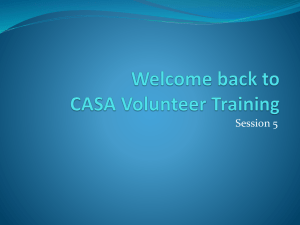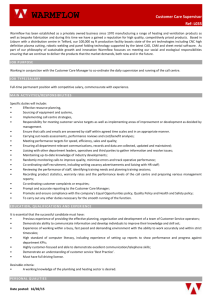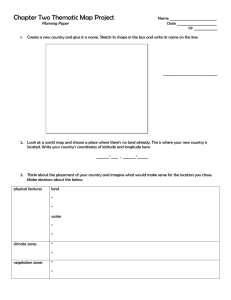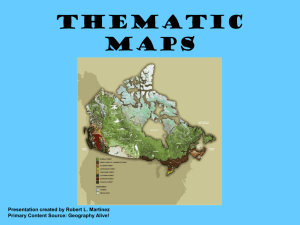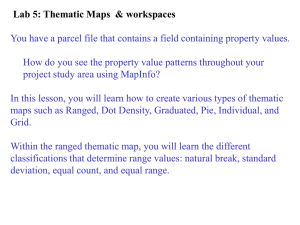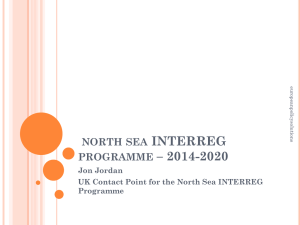Critical Research Pairings
advertisement
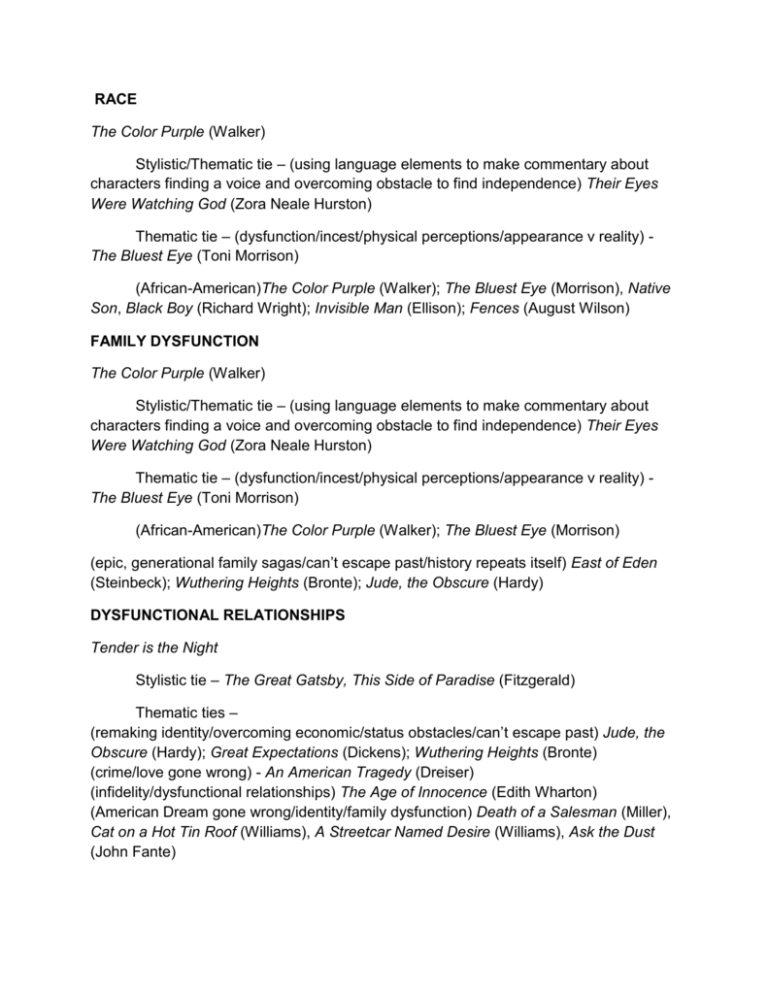
RACE The Color Purple (Walker) Stylistic/Thematic tie – (using language elements to make commentary about characters finding a voice and overcoming obstacle to find independence) Their Eyes Were Watching God (Zora Neale Hurston) Thematic tie – (dysfunction/incest/physical perceptions/appearance v reality) The Bluest Eye (Toni Morrison) (African-American)The Color Purple (Walker); The Bluest Eye (Morrison), Native Son, Black Boy (Richard Wright); Invisible Man (Ellison); Fences (August Wilson) FAMILY DYSFUNCTION The Color Purple (Walker) Stylistic/Thematic tie – (using language elements to make commentary about characters finding a voice and overcoming obstacle to find independence) Their Eyes Were Watching God (Zora Neale Hurston) Thematic tie – (dysfunction/incest/physical perceptions/appearance v reality) The Bluest Eye (Toni Morrison) (African-American)The Color Purple (Walker); The Bluest Eye (Morrison) (epic, generational family sagas/can’t escape past/history repeats itself) East of Eden (Steinbeck); Wuthering Heights (Bronte); Jude, the Obscure (Hardy) DYSFUNCTIONAL RELATIONSHIPS Tender is the Night Stylistic tie – The Great Gatsby, This Side of Paradise (Fitzgerald) Thematic ties – (remaking identity/overcoming economic/status obstacles/can’t escape past) Jude, the Obscure (Hardy); Great Expectations (Dickens); Wuthering Heights (Bronte) (crime/love gone wrong) - An American Tragedy (Dreiser) (infidelity/dysfunctional relationships) The Age of Innocence (Edith Wharton) (American Dream gone wrong/identity/family dysfunction) Death of a Salesman (Miller), Cat on a Hot Tin Roof (Williams), A Streetcar Named Desire (Williams), Ask the Dust (John Fante) ADVENTURE/MYSTERY/CRIME Thematic tie - (murder/mystery)…all below Genre tie (historical fiction) - An American Tragedy (Dreiser); Alias Grace (Atwood) Rhetorical tie (religious, mythological allusions) - Chronicle of a Death Foretold (Garcia-Marquez), East of Eden (Steinbeck) Crime and Punishment (Dostoyevsky) (existential dilemma/meaninglessness of life) Notes from Underground (Dostoyevsky); The Stranger (Camus); The Trial (Kafka) (crime novels) – Alias Grace (Atwood); In Cold Blood (Capote); An American Tragedy (Dreiser); Chronicle of a Death Foretold (Garcia-Marquez) An American Tragedy Stylistic tie – Sister Carrie (Dreiser) Thematic tie – (American dream gone wrong) – The Great Gatsby (Fitzgerald) Genre tie - (Crime novels) – Alias Grace (Atwood); In Cold Blood (Capote); (guilt for crime) Crime and Punishment (Dostoyevsky – most challenging, but great) SWEEPING FAMILY EPICS East of Eden (Steinbeck) Stylistic/Context tie – Grapes of Wrath (Steinbeck) Thematic tie – (epic, generational family saga/can’t escape past/unrequited love) Wuthering Heights (Bronte); (trying to escape past/remaking identity) – Great Expectations (Dickens); (crime/love gone wrong) - An American Tragedy (Dreiser) Pride and Prejudice or any Jane Austen novel Thematic tie – (social class struggles/women’s struggle for independence/marriage for rights/gender) - Jane Eyre (Bronte); (modern retelling) Wide Sargasso Sea, (Rhys) (American perspective) -The House of Mirth (Wharton) Tender is the Night (Fitzgerald) Stylistic tie – This Side of Paradise (Fitzgerald) Thematic ties – (infidelity/dysfunctional relationships) The Age of Innocence (Edith Wharton); (infidelity/mental breakdown) A Streetcar Named Desire (a play, Tennessee Williams); (mental breakdown/psychiatry) – Alias Grace (Atwood) WAR For Whom the Bell Tolls Stylistic/thematic tie – A Farewell to Arms (Hemingway) Thematic tie – (senselessness of war/loss of innocence/patriotic idealism) –All Quiet on the Western Front (Remarque); The Quiet American (Graham Greene); (war/absurdity of bureaucracy/satire) Catch 22 (Heller) – more difficult in style because of shifting points of view, satire All Quiet on the Western Front by Erich Maria Remarque (focus is on the absurdity of war for young German soldiers during World War I) Regeneration by Pat Barker, focuses on soldiers receiving treatment in an army hospital (after physical and emotional damage) during WWI, three of which were actual poets: Siegfried Sassoon, Wilfred Owen, and Robert Graves. It is a novel, but has a bit of actual history and actual people thrown in. (If you end up choosing/liking this one, it is the first of a fantastic trilogy.) If you are interested in (exaggerated?, post-apocalyptic) single-party state/government control, you could read Orwell’s 1984 (Big Brother is watching you!) or The Handmaid’s Tale by Margaret Atwood (which connects ideas on government control and feminism, so that could tie with Woolf’s essay). BE CAREFUL WHAT YOU WISH FOR Great Expectations Thematic/Stylistic tie – (coming of age/overcoming dysfunctional family/past life) – David Copperfield (Dickens) Thematic ties – (remaking identity/overcoming obstacle/can’t escape past) Jude, the Obscure (Hardy); Tess of the D’Urbervilles (Hardy); (rich girl, poor boy/ changing identity/haunting past) Wuthering Heights (Bronte) Picture of Dorian Gray (Wilde); Style/thematic tie – any of Wilde’s plays Thematic ties – (superficiality in society) Emma (Austen – or any of Jane Austen’s novels, and she too is satirical albeit in a lighter way); (desire to preserve youth/appearance v reality) East of Eden (Steinbeck), A Streetcar Named Desire (play – Tennessee Williams) Crime and Punishment (Dostoyevsky) (existential dilemma/meaninglessness of life) Notes from Underground (Dostoyevsky); The Stranger (Camus); The Trial (Kafka) (crime novels) – Alias Grace (Atwood); In Cold Blood (Capote); An American Tragedy (Dreiser); Chronicle of a Death Foretold (Garcia-Marquez) HISTORY REPEATS ITSELF Death of a Salesman (Miller) Thematic tie (African-American retelling) Fences (Wilson); (the American dream gone wrong/remaking identity) The Great Gatsby (Fitzgerald); (children bear the sins of the father) East of Eden (Steinbeck); (can’t escape fate/parent-child roles/Greek tragedy rewritten) Mourning Becomes Electra (O’Neill), (remaking identity/overcoming obstacle/can’t escape past) Jude, the Obscure (Hardy); Tess of the D’Urbervilles (Hardy); (rich girl, poor boy/ changing identity/haunting past) Wuthering Heights (Bronte); East of Eden (Steinbeck) MAN VS INSTITUTION One Flew over the Cuckoo’s Nest (man vs. institution, existential) The Trial (Kafka); (psychiatry/destructive woman) Alias Grace (Atwood); (conforming to society’s norms) Invisible Man (Ellison); (destructive woman) East of Eden (Steinbeck), The Grapes of Wrath (Steinbeck) Crime and Punishment (Dostoyevsky) (existential dilemma/meaninglessness of life) Notes from Underground (Dostoyevsky); The Stranger (Camus); The Trial (Kafka) MAN CONTROLLED BY THE SYSTEM One Flew Over the Cuckoo’s Nest – (Ken Kesey) man commits crime and pretends to be crazy rather than go to jail, he opts for mental institution; could tie with imprisonment/justice ideas and with relationships between accused and patients/doctor/nurse and how all perceive each other The Trial (Kafka) – man supposedly commits crime…never quite clear; how much control does individual have over direction of his life (fate?) WOMEN CONTROLLED BY SOCIETY/SYSTEM Possible thematic/character ties, but not the same contextually/plot wise – The Age of Innocence or The House of Mirth (Edith Wharton) - (women controlled/destroyed by the system – societal expectations on marriage/relationships/proper ways for women to behave; turn-of-the-century New York) A Streetcar Named Desire (a play, Tennessee Williams); (woman loses control of mental faculties, not deemed proper by expectations of society with respect to relationships/class/gender; 1940’s New Orleans) Alias Grace (also by Atwood, historical fiction) Alias Grace – historical fiction; real murder in Canada, retold from Grace’s point of view as well as her psychiatrist and other acquaintances, newspaper clippings, trial record, dreams…you have to piece it all together and figure out what’s true and what’s not AMERICAN DREAM GONE WRONG The Great Gatsby Stylistic tie (some thematic tie – infidelity, living beyond means) – Tender is the Night (Fitzgerald) Thematic tie (American dream gone wrong/crime) – An American Tragedy (Dreiser); (Amer. dream/remaking identity/can’t escape past) – Death of a Salesman (Miller – play); (marital infidelity and frustrated desires) – Ethan Frome (Wharton), The Age of Innocence (Wharton), East of Eden (Steinbeck), A Streetcar Named Desire (play – Tennessee Williams), Fences (Wilson) GOVERNMENT CONTROL (political control, science fiction) 1984 (Orwell) – (post-apocalyptic, women as breeders) The Handmaid’s Tale (Atwood); (loss of monogamous relationship) Brave New World (Huxley); (banned books/banned learning) Fahrenheit 451 (Bradbury), The Trial (Kafka) 1984 (Orwell) - (political control, science fiction; Big Brother is watching; no individual identity, sex is no longer supposed to be for pleasure) Brave New World (Aldus Huxley) - (loss of monogamous relationship) Fahrenheit 451 (Ray Bradbury) - (banned books/banned learning/telescreens see in to the home/ friends and spouses turn on each other) PERIOD DRAMAS Ethan Fromme (Wharton) Stylistic and thematic (infidelity) tie – The Age of Innocence (Wharton), The House of Mirth (turn of the century; romance in industrial age, feminism) Thematic ties – (marital infidelity and frustrated desires) – An American Tragedy (Dreiser); The Great Gatsby, if not read before, or Tender is the Night (Fitzgerald); Tess of the D’Urbervilles (Hardy) Anything by EM Forster or Henry James East of Eden (Steinbeck) Stylistic/Context tie – Grapes of Wrath (Steinbeck) Thematic tie – (epic, generational family saga/can’t escape past/unrequited love) Wuthering Heights (Bronte); (trying to escape past/remaking identity) – Great Expectations (Dickens) GOTHIC Dracula (Stoker) Style/genre/thematic tie (wanting too much knowledge/power) – Frankenstein (Shelley); The Turn of the Screw (James) PSYCHOLOGICAL ISSUES Alias Grace – historical fiction; real murder in Canada, retold from Grace’s point of view as well as her psychiatrist and other acquaintances, newspaper clippings, trial record, dreams…you have to piece it all together and figure out what’s true and what’s not The Blind Assassin – (also by Atwood) – Atwood loves to play with structure and this too is historical fiction with the “accident” being a true story while not much else is. As with Alias Grace there are many truths, slowly revealed, and there are several stories within the story…nothing is as it seems. Ordinary People – (Judith Guest) – modern lit, set in late 70’s or early 80’s, if you are interested in the psychiatrist/dream angle. A teenage boy has tried to kill himself and in sessions with his psychiatrist and through disturbing interactions with his dysfunctional family (mom, in particular), you realize what happened. Possibly a nurture over nature argument. Chronicle of a Death Foretold – (Gabriel Garcia Marquez) a murder revealed in a nonlinear way from various characters; have to decipher what is real/unreal; symbolic dreams also reveal ‘truths’ about the characters; some is revealed journalistic style, some in dreamy magical realism – could make for thematic and structural comparisons One Flew Over the Cuckoo’s Nest – (Ken Kesey) man commits crime and pretends to be crazy rather than go to jail, he opts for mental institution; could tie with imprisonment/justice ideas and with relationships between accused and patients/doctor/nurse and how all perceive each other In Cold Blood – (Truman Capote) non-fiction, based on first serial killing in America; retold through interviews with killer, court records; could be an interesting compare/contrast with fact and fiction An American Tragedy (Theodore Dreiser) if you are interested in historical fiction (murder in upstate New York) and would like an American text. The stories are quite different, except that both, in part, deal with relationships/affairs that end badly and both were from highly publicized/sensationalized trials in their respective countries. Equus – I would not recommend this play to everyone. Warning- it is disturbing and it deals with sexual dysfunction. It is again historical fiction as there was really a crime where a teen boy blinded six horses. Then Peter Shaffer (playwright) fictionalized what might have happened. Through interviews with a psychologist, the disturbing truth is slowly revealed. Nabakov – narrators that manipulate reader Lolita, Pale Fire The Road could be paired with The Handmaid’s Tale another post-apocalyptic vision (here fertile women are breeders, main character is dealing with this new life and the loss of her husband and child – she doesn’t know what happened to the child so this hope keeps her going), but these visions are quite different, so it may be challenging. You could also focus on the father-son relationship which is arguably the strongest element of the Road. When I think of father-son relationships, I think of Steinbeck (you can see the father-son bond between George and Lennie in Of Mice and Men, for example). Could look at East of Eden or perhaps the best option might be The Grapes of Wrath since it not only has family relationships to focus on, but it also set in another time of struggle (The depression) and it entails a journey. Or Of Mice and Men. Check out blurbs on each online. The Color Purple You could stick thematically with African American struggle, all different of course, but I suggest Morrison’s Beloved or The Bluest Eye. All novels also contain disturbing dysfunctional family dilemmas and identity issues for some of the main characters. If you want a male perspective to compare, check out Native Son – interesting (and disturbing) ideas on race and justice, and a different sort of main character, an anti-hero of sorts, so Baldwin is playing with reader’s emotions/sympathies throughout. Another possibility is Their Eyes were Watching God, but you might have told me you didn’t like that one?? The Bluest Eye If you like the way Morrison writes, I suggest Beloved. Both novels contain disturbing dysfunctional family dilemmas and identity issues for some of the main characters. If you want a male perspective to compare, check out Native Son – interesting (and disturbing) ideas on race and justice, and a different sort of main character, an anti-hero of sorts, so Baldwin is playing with reader’s emotions/sympathies throughout. Another possibility is Their Eyes were Watching God, by Zora Neale Hurston. The main character is much older but there are similar identity/race issues. In Cold Blood Alias Grace – historical fiction, like Devil in the White City, murders committed (supposedly) by young maid working in the home. Atwood play with point of view and structure – sometimes told from Grace’s point of view, some revealed by other characters, some by interviews with psychiatrist – could tie to capote talking to prisoners. Chronicle of a Death Foretold – (Gabriel Garcia Marquez) a murder revealed in a nonlinear way from various characters; have to decipher what is real/unreal; symbolic dreams also reveal ‘truths’ about the characters; some is revealed journalistic style, some in dreamy magical realism – could make for thematic and structural comparisons One Flew Over the Cuckoo’s Nest – man commits crime and pretends to be crazy rather than go to jail, he opts for mental institution; could tie with imprisonment/justice ideas and with relationships between Capote/accused and patients/doctor/nurse WAR A Farewell to Arms Could stick with Hemingway and read For Whom the Bell Tolls – love/wartime/language ties If you are interested in the war angle, you could check out the following: All Quiet on the Western Front by Erich Maria Remarque (focus is on the absurdity of war for young German soldiers during World War I) Regeneration by Pat Barker, focuses on soldiers receiving treatment in an army hospital (after physical and emotional damage) during WWI, three of which were actual poets: Siegfried Sassoon, Wilfred Owen, and Robert Graves. It is a novel, but has a bit of actual history and actual people thrown in. (If you end up choosing/liking this one, it is the first of a fantastic trilogy.) The End of the Affair by Graham Greene, also semi-autobiographical as main character is young writer in London during WWII; love triangle and heartbreak ensue The Quiet American also by Graham Greene (love triangle and deception amongst friends and lovers during Vietnam War) Atonement by Ian McEwan (the movie is so-so; the novel is fabulous) – love torn apart by war and other factors (some disturbing); the lovers try to get back to each other, as Hemingway’s characters do although in very different circumstances Class Issues Pride and Prejudice Could easily pair with another Jane Austen work; Sense and Sensibility is my personal favorite, but you could literally take your pick – all making satirical commentary on gender and class An Ideal Husband – play by Oscar Wilde also satirically comments on gender and class, but Wilde is a bit more biting than Austen (he could be since he was a man!) Could look at other works from Wilde as well The Age of Innocence or The House of Mirth, both by Edith Wharton also look at gender and class, but in late 1800’s/early 1900’s New York Jane Eyre by Charlotte Bronte follows the life of a young girl who is, for all intents and purposes, orphaned and treated miserably due to her class and gender, who fights for knowledge and independence and love as she grows older, and has to overcome many obstacles along the way; darker than Austen, but could make for an interesting comparison The Age of Innocence If you like Edith Wharton’s style and the context of this work, you could read another of her novels, The House of Mirth, which also focuses on gender and (upper) class in late 1800’s New York. If you are interested in gender/class struggles, you could read one of Jane Austen’s novels. My favorites are Pride and Prejudice and Sense and Sensibility, but you could really pick any of her works. She is a bit satirical, and she looks at similar issues from a lower class female perspective in England. Oscar Wilde’s plays, such as The Importance of Being Earnest, also focus on class and gender in sophisticated British society; he too is satirical and more biting than Austen If you are interested in the infidelity/love story angle, you could check out Wharton’s Ethan Frome or Fitzgerald’s The Great Gatsby or Tender is the Night The Great Gatsby If you like Fitzgerald’s writing/context, you could pair with another of his works, Tender is the Night or This Side of Paradise. To me, they are not as ‘great’ as Gatsby, but just my opinion If interested in the ideas of remaking one’s identity and trying to escape the past (or reality) or the high society masks people wear, you could check out any of the following; aka - Be careful what you wish for Great Expectations (Dickens) (coming of age; overcoming dysfunctional family/past life; remaking identity to fit into high society England) Wuthering Heights (Bronte) (rich girl, poor boy/ changing identity/haunting past) Picture of Dorian Gray (Wilde) (Makes a deal with the “devil” to remake (or maintain) identity at a high cost) A Streetcar Named Desire (play – Tennessee Williams) (woman tries to hide scandal in her past as she tries to find love, in vain) aka - Superficiality in Society Emma (Austen – or any of Jane Austen’s novels, she is satirical in a light way) Any of Oscar Wilde’s plays or Dorian Gray (novel) The Age of Innocence – (Edith Wharton) high society in late 1800’s New York; the scandals and the lies to cover reality Anna Karenina If you love Russian history mixed with sweeping (yet problematic) love stories – check out Eugene Onegin by Pushkin (a novel in verse) or Dr Zhivago by Pasternak If you love the dark, tortured side of Russian life, check out Dostoyevsky’s Notes from Underground (more existential – meaning of life – shorter) If you are interested in farm life/agricultural aspects of novel – check out Steinbeck’s The Grapes of Wrath for an American take on a farming family Betrayal in marriage and/or societal expectations on women/relationships– Madame Bovary (Flaubert) or The Age of Innocence (Wharton) or The Scarlet Letter (Hawthorne) Hypocrisy of social class in aristocratic society – Tolstoy’s A Confession, Wharton’s Age of Innocence, virtually any play by Oscar Wilde or novel by Jane Austen The Unbearable Lightness of Being by Kundera alludes to Anna Karenina in a few ways, and it’s fantastic…a more modern (1960’s Prague) take on promiscuity in marriage The Blind Assassin – Atwood loves to play with structure and this is historical fiction with the “accident” being a true story while other details are often not – you have to put the puzzle pieces together. There are many truths, slowly revealed, and there are several stories within the story…nothing is as it seems. -could be paired with Alias Grace, also by Atwood, also historical fiction, also plays around with structure. Here, there is a real murder mystery in Canada, but pieces have been fictionalized. You get details from Grace, from Grace’s alternate personality, from her psychiatrist, from newspaper clipping/trial records and other characters. Again, you have to decide what is real and what is not. -could be paired with Atonement by Ian McEwan which also contains a crime to figure out and a story within a story. This also takes place in similar time period – 30s and 40s, but in England rather than in Canada. -Could be paired with Possession by AS Byatt which is also historical fiction and deals with a pair of lovers and poets in the Victorian Era and a pair of scholars trying to figure out a mystery in modern times. This too plays around with structure and a variety of texts (pieces of poems, letters, diaries…) -could be paired with An American Tragedy if you are interested in historical fiction (murder in upstate New York) and would like an American text. The stories are quite different, except that both, in part, deal with extramarital affairs that end badly. Possible Pairings with The Handmaid’s Tale

